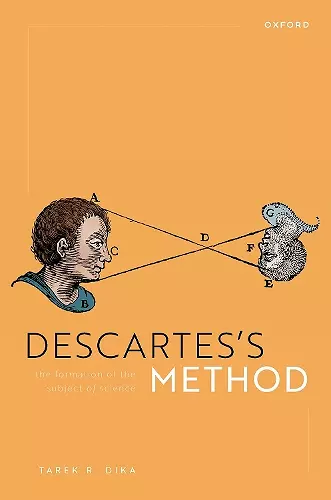Descartes's Method
The Formation of the Subject of Science
Format:Hardback
Publisher:Oxford University Press
Published:15th Mar '23
Currently unavailable, and unfortunately no date known when it will be back

Descartes's Method develops an ontological interpretation of Descartes's method as a dynamic and, within limits, differentiable problem-solving cognitive disposition or habitus, which can be actualized or applied to different problems in various ways, depending on the nature of the problem. Parts I-II develop the foundations of an habitual interpretation of Descartes's method, while Parts III-V demonstrate the fruits of such an interpretation in metaphysics, natural philosophy, and mathematics. The first book to draw on the recently discovered Cambridge manuscript of Descartes's Rules for the Direction of the Mind, Descartes's Method concretely demonstrates the efficacy of Descartes's method in the sciences and the underlying unity of Descartes's method from Rules for the Direction of the Mind to Principles of Philosophy (1644).
No question in Descartes's thought is more difficult than his method. The Rules for the Direction of the Mind, an unfinished treatise on method left unpublished in Descartes's lifetime has given rise to numerous inconsistent interpretations, nor is it easy to see how it is reflected in his later work. Tarek Dika's new book takes account of startling new manuscript discoveries about the Rules and offers a bold and unified new reading of the text and the project of method in Descartes's thought. It changes the way in which we see Descartes, and will open up new conversations about this canonical figure in the history of philosophy and science. * Daniel Garber, Princeton University *
The discussion in Descartes's Method is well-sourced throughout and exhibits an impressive command of Descartes's writings as well as of the relevant context, including the historical background required to understand properly illustrative treatments in the Rules of mathematics and optics. * Tad Schmaltz, University of Michigan *
Many scholars have tried to identify Descartes's method with this or that technique, without convincing results. In the most comprehensive study ever written on this topic, Tarek Dika shows that, far from being a uniform procedure, Descartes's method is an acquired habit (habitus) closely related to Aristotelian phronesis. The change of focus is illuminating. The width of views, the clarity of exposition, the breadth of the underlying culture, the search for the highest precision on each point: this is undoubtedly a great book. * Denis Kambouchner, University of Paris I Panthéon-Sorbonne *
If Dika is correct, generations of internal, technical reconstruction of Descartes' researches in natural philosophy and the related more narrow sciences will need to be re-written in terms of Descartes' application of (Dika's version of) the method. * John A. Schuster, Annals of Science *
Descartes's Method by Tarek Dika is perhaps the most thorough book on Descartes's Rules for the Direction of the Mind. It is an exceptional volume written for Cartesian scholars and provides a novel and ingenious interpretation of Descartes's infamous method, reviving it from literary slumber. [...] This publication [...] will spark much needed research and debate on Descartes's early philosophy, especially his method. * Notre Dame Philosophical Reviews *
Dika's work dovetails well with recent strands in the history of science that have attended to the cultivation of judgment and epistemic virtues in scientific practice [...] [and] offers directions for weaving back together historiographies in the history of philosophy and the history of science. * HOPOS: The Journal of the International Society for the History of Philosophy of Science *
Dika's methodology is highly original. His approach to one of the greatest systems of philosophical modernity is based on his reading of a fragmentary text, and on the comparative analysis of the different versions of these fragments. He designs his assessment of the variations from one versionof the Rules to the other as a tool to exhibit the underlying unity of this work. * Élodie Cassan, The Thomist *
ISBN: 9780192869869
Dimensions: 240mm x 163mm x 24mm
Weight: 732g
408 pages